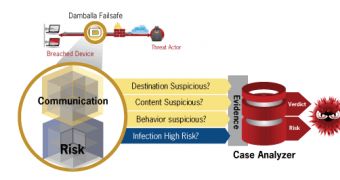While malware developers keep working on improving their creations by leveraging non-HTTP channels, such as peer-to-peer, most malicious programs still use HTTP. Worryingly, over 75% of these pieces of malware are capable of evading traditional security measures, researchers from Damballa warn.
“Malware today is using HTTP to 'blend in' and evade detection by sending small traces of information over the core ports and protocols that enterprises allow in and out of their network. Our research indicates that firewalls and IPS are highly ineffective at detecting next-gen malware infected devices,” Damballa researcher Terry Nelms noted.
In his research, Nelms utilized a prototype tool called ExecScent to identify malware on hundreds of hosts running traditional security products.
As a result of this research, Damballa has launched a new HTTP Request Profiler, a solution that integrates advanced HTTP request profiling capabilities by leveraging ExecScent.
HTTP Request Profiler, one of the seven profilers included in Damballa’s Failsafe platform, leverages the company’s Big Data harvesting and machine learning systems to statistically identify malicious structures within HTTP requests.

 14 DAY TRIAL //
14 DAY TRIAL //